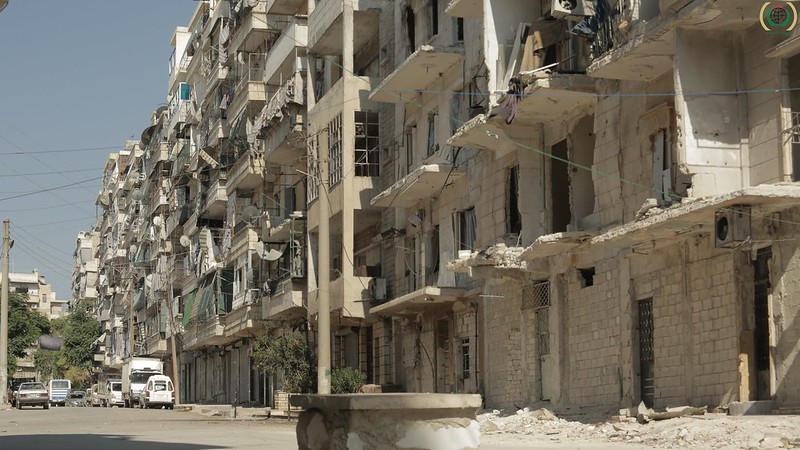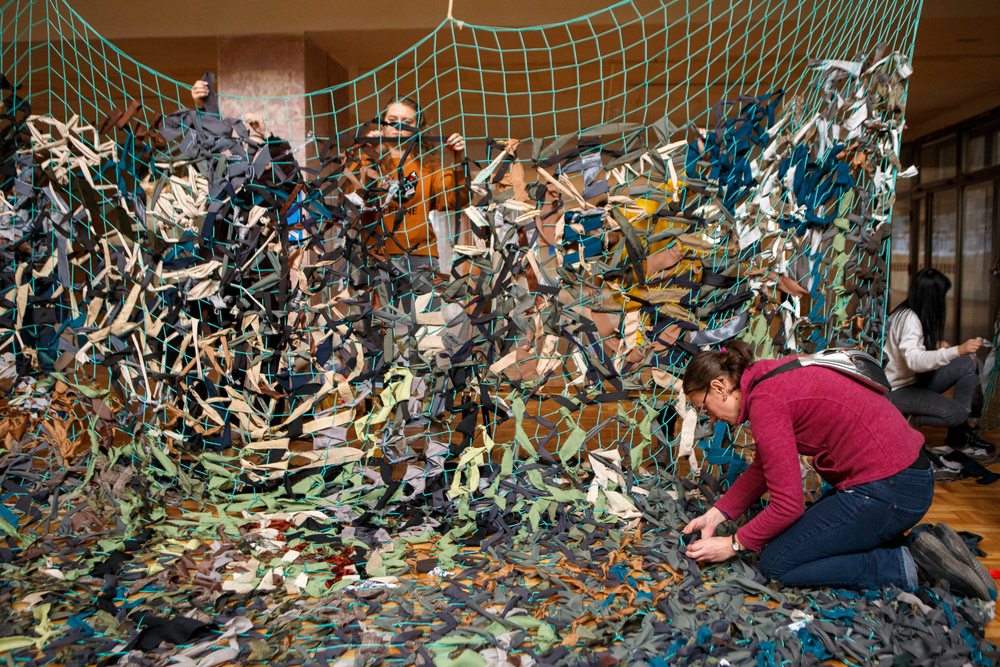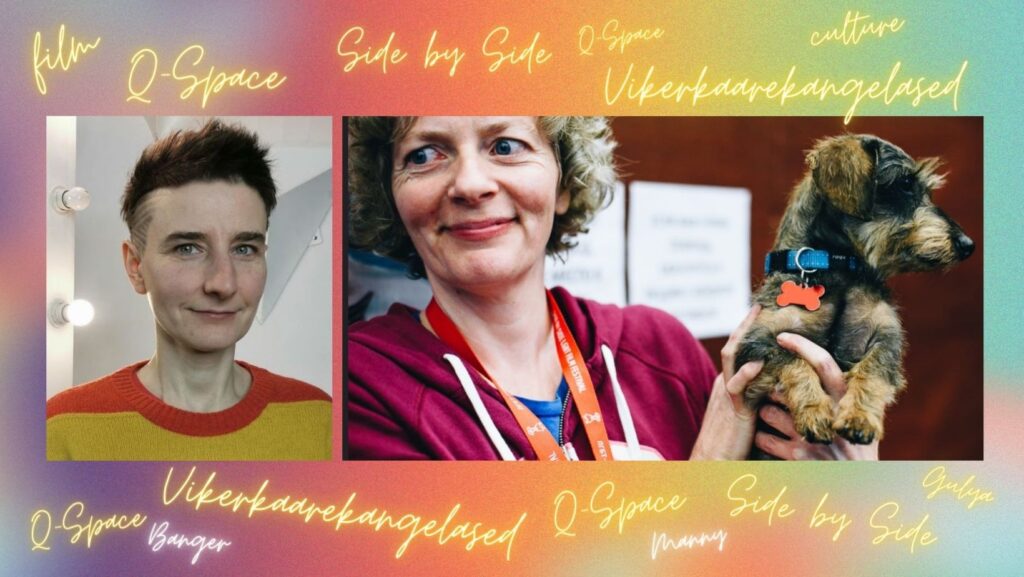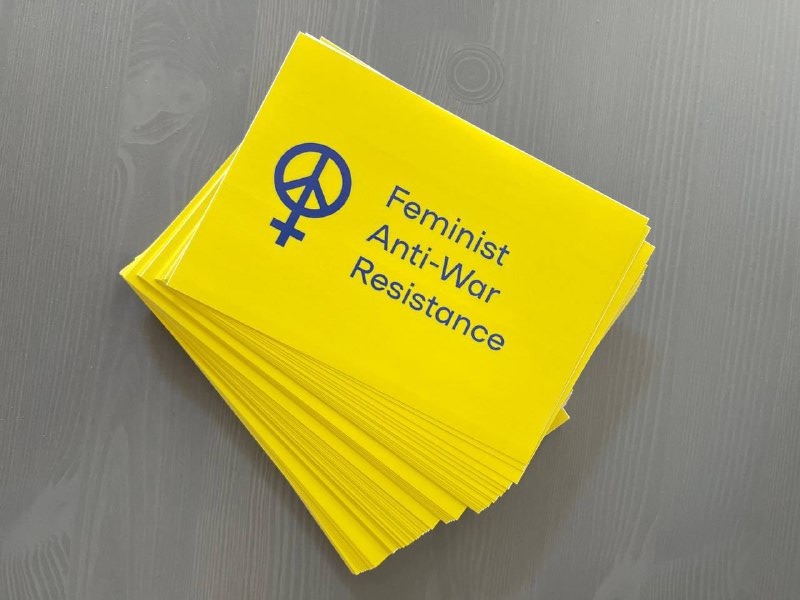Wars do not stand in isolation from each other, they are linked by violent structures
Like Ukraine today, Syria has endured multiple horrors of war. The difference is that to the war in Syria, the world did not react so sharply. The war in Ukraine was made possible because Russia was able to act in Syria without consequences. To contemplate the root causes of wars and violence regardless of location, Birgit Poopuu and Eret Talviste analyse wars from a feminist and decolonial perspective.
Syrian doctor Amani Ballour asks: “Why did the protective masks run out in two months? But the rockets and bombs that kill Syrians didn’t run out for nine years?” Ballour ran the underground hospital in Ghouta, which was set up as a citizens’ initiative, during a period when the Syrian regime, together with Russia, was bombing the hospital and other Syrian cities incessantly, targeting civilian buildings, medical institutions, schools and markets.[1]
In the ’Western’ media, there have been many analyses of the war in Ukraine which treat it in a reductive manner that is inconsiderate of the broader context in which the war is happening. On the one hand, this is understandable because Ukraine is located in Europe, which makes that particular war closer (both geographically and historically) to many, especially east European, countries. In this light, talking about the mistakes made in Syria, the Syrian war victims, and the more general causes of the war seems inappropriate and secondary because the focus is centred around saving Ukraine. On the other hand, we need to be aware of Syrian activist Marcelle Shehwaro’s words, that remind us that what is happening in Ukraine is possible because we allowed Russia to act in Syria without consequences. Yet the war in Ukraine could have been prevented.[2]
We live at a time when, at least formally, there are no more great empires. Accordingly, many small states with distinct cultures and languages, including Estonia and Ukraine, are free to decide their own destiny. However, the divisions of the colonial era live on in today’s seemingly post-colonial world – the hierarchies and inequalities that exist between North and South, East and West are very palpable. Violence is unequally distributed around the world, with most wars fought in the South. We should be ready to ask ourselves why Syria and Ukraine have been treated differently. The Syrians have just experienced what the Ukrainians are experiencing now, without the world reacting so sharply. Ibrahim, a Syrian war refugee, describes it this way: „But there is a difference between Syria and Ukraine. Those who flee Putin’s bombs in Ukraine […] flee to safe countries with governments that receive them as heroes. In Syria, we had to flee [from] bombs to humiliation. We did not find a place to flee to that welcomed us safely, with love and compassion. I’m very sympathetic to the Ukrainian people. Nobody deserves war, destruction, and exile from their homeland. But the difference in treatment just hurts so much.“[3]

Bombed house in Aleppo, Syria, 2013. Photo: IHH Humanitarian Relief Foundation, Creative Commons
Western and Eastern Europe’s relationship with colonialism and racism
Since Putin’s military, unlawful invasion of Ukraine, a certain narrative has emerged among some left-wing intellectuals in ‘the West’. Although that narrative condemns war and Putin’s crimes, it also often points out that is it somewhat hypocritical to show sympathy and offer aid to Ukraine, because the greater imperialist power is the US, which has contributed to the war in the Global South in the same way that Russia has contributed to the war in Syria.[4] But the refusal to show solidarity with Ukraine, based on the argument that NATO/US/the West is a greater “evil”, completely ignores the complex history of Eastern and Central European countries and the struggle for freedom and justice. Europe, according to some, is becoming one homogenous Europe – the West.
The use of such an umbrella term is unfair to ‘peripheral’ parts of Europe whose history is not linked to Western colonialism. Eastern European countries have not massively and brutally colonised India, Africa, South America or the Caribbean. On the contrary, Eastern Europe has been colonised by Russia and other empires. Colonialism and racial and ethnic discrimination in the East is much more complex than certain groups in the West are prepared to understand. The consequence of a Western-centric approach to colonialism is that the complex history of European countries located in the East, is overshadowed by the history of the major Western European countries. This, in turn, exacerbates fragmentation and undermines solidarity in those parts of the world where there should be a united stance against Putin and his regime. We should acknowledge that one of the reasons why the war in Ukraine has sparked the narrative that critiques sympathy towards Ukraine, is racism – people are more sympathetic to lives in the Global North. Here we can see how racial hierarchies[5] still shape whose lives count in international relations. As Judith Butler puts it, there is a clear difference in whose lives matter (e.g., her book Frames of War). But alongside the denunciation of dehumanizing and racist approaches, we should try to understand the colonial narrative in all its complexity, taking into account not only the colonial relationship of Western countries with the Global South, but also Russia’s relationship with Eastern Europe.
We have to be able to consider multiple forms of complex racial relations here. First, it is not fair that the Syrian war (in the Global South) did not receive as much understanding as the Ukrainian war (in the Global North). Second, the (mainly Western) narrative of avoiding support for Ukraine (the East) by claiming that NATO/US/West is the greater evil equally reinforces an economy of sympathy that does not treat different parts of the world equally. Instead, we should be proud to see the kindness with which the people of Ukraine are welcomed in Eastern Europe and beyond. This kind of boundless solidarity leads to a better world and humanity that could continue to guide us in our support for all the vulnerable people around the world. We must condemn all wars and treat people seeking refuge from war with much more humanity and dignity.[6] Treating people humanely requires a united condemnation of all racist and dehumanising attitudes and an understanding that if some people’s lives don’t matter to us, then we are the ones undermining the humane world.[7]
We can stand with and support the people of Ukraine, unequivocally condemn Russia’s aggression and, like the President of Ukraine, make sure that Russia does not walk away without consequences, as it did in Syria. We can and must condemn Russia’s aggression, but at the same time we must be prepared to condemn imperial intervention in other countries (e.g. US intervention in Iraq and Afghanistan, US military support for Israel, whose apartheid regime against the Palestinians commits crimes on a daily basis[8]).

Destruction in Mariupol, April 2022. Photo: mahhai, Flickr, Creative Commons
Different violent structures and war
When we look at Putin alone as the cause of the current war in Ukraine, then we are ignorant to or lack courage to delve into the underlying causes of wars, such as patriarchy, capitalism and militarism. According to the feminist bell hooks, it is impossible and pointless to study militarism in isolation from patriarchy, racism and capitalism, because they work together.[9] Feminist and decolonial analysis is necessary in the analysis of wars and conflicts, as it does not fall into the common trap of assuming that it is only possible to deal with one problem at a time; the aim of an intersectional analysis is to see the links between different crises and types of violence. Feminist approaches use the term “gendered continuum of violence”, which emphasises how peacetime violence is closely linked to wartime violence. Only if the formulation of the problem takes into account the fact that war is made possible by a combination of different types of violence can we see it as a complex problem for which a solution can be sought.
Yes, Russia has been able to act for quite a long time without being held accountable for its actions. In addition to the prevailing impunity in international relations, attention must be drawn to the unwavering support for militarism and the belief that military intervention is something inevitable, alongside other violent structures. Ray Acheson, Disarmament Programme Director of the Women’s International League for Peace and Freedom asks, how did we get here?[10] She refers to a situation where militarism is the common order of the day in the world. The commonness of militarism leads to the attitude that Amani Ballour describes as a state in which no one wonders why we never have a shortage of guns, but we lack beds in hospitals, decent wages, protective masks, food and everything else. One of the UN’s most important policies „Women, Peace and Security“, which originated in feminist peace movements, says that to prevent conflict, it is necessary to dismantle existing violent structures (such as rampant militarism, but also poverty). However, as researchers point out, the policy of demilitarism is not prominent in the current security context. It is obvious that demilitarism must be dealt with in peacetime. If we do not prevent conflicts in peacetime, there is no reason to expect that the next war will not come, because militarism means being ready for war. Regrettably, throughout the pandemic, military spending exceeded spending on health care, despite the fact that the lack of support for care suddenly became very visible in society.[11]

UZHHOROD, UKRAINE – FEBRUARY 26, 2022 – Local residents make camouflage nets for Ukrainian defenders, Uzhhorod, Zakarpattia Region, western Ukraine
Whose knowledge matters in policy making?
Feminist and decolonial approaches help us to think about whose knowledge matters in politics and why. For example, no women are involved in the peace talks between Ukraine and Russia. In the context of wars, men with guns are elevated to the status of heroes and those who oppose the war with bare hands, peacefully, are ignored.[12] Yet, in Ukraine, people have blocked the path of tanks or taken away road signs to confuse the enemy. Particularly little attention is paid to the people (often women) who work day in, day out to ensure that all the care work that is needed for daily life to continue even during the most brutal moments of war is there. It is critical that we recognise that it is this care work – aid, education, food and the support to families, friends, and communities, and all the other infrastructure that hold our world together and that actually create security.
Would the focus be on demilitarisation and peace if women from different backgrounds and experiences were at the table and our approach to gender was more intersectional? Estonia has had a female president and has a female prime minister. Estonia has Sveta Grigorjeva, who gave a speech in the Rose Garden in August 2020 in which she aptly and deservedly highlighted painful problems in Estonian society: the wage poverty, the lack of concern for the lives and well-being of many people, the persecution of those who are different. Sveta undertook an intersectional analysis of Estonian society, understanding the differences in our backgrounds, situations and identities, looking at what it means to be a woman called Masha or Sveta and whether a woman with such a name can enter politics in the same way as Jürgen or Martin. One of the things that Ukraine is fighting for now is a chance for a future such as the one we have here in Estonia where: an “ordinary” woman openly criticises a political establishment at party where the whole establishment is present.[13]

26th February, 2022, Ukraine, Uzhgorod-Vyshne Nemeckoe: Refugees from Ukraine on the border with Slovakia (checkpoint “Uzhgorod-Vyshne Nemeckoe”) in the Zakarpatya regions. — Photo by Fotoreserg
Under the rule of Vladimir Putin, where everything and everyone in the country is subordinated to the vision of one man and his worshippers, this is impossible. According to Anna Politkovskaya, Putin has repeatedly shown in public that he fundamentally does not understand what dialogue means. According to Putin, the inferior must not be in a discussion with the superior. If a subordinate allows that, he is an enemy. Putin is exclusively a monologist.[14] Such a violent attitude, where dissent is not accepted and a strict hierarchical pattern of communication prevails, nullifies democracy with freedom of thought and expression from the outset. Putin has hijacked the label of “traditional values” and filled it with content that suggests the perfection of patriarchy. Under this label, anything that deviates in the slightest from traditional masculine norms has been muzzled or even criminalised. Consider, for example, how members of the feminist punk rock band Pussy Riot were imprisoned in Russia for criticising authority.
A country with “traditional values” is sustained by the “traditional family”, where the man is the head of the family, working and earning money while the woman stays at home and raises children. According to Putin’s values, ‘violence against women’, which is not called by that name in Russia, is tolerated, normalised and justified.[15] In a patriarchal social order, men lead and own states and the citizens living in them, especially women, but also other men who are different because of their skin colour, sexual orientation or something else.[16] It’s systems like these that make the Putins possible, because they send a message to the man: everything is allowed to you, you are powerful, you are invincible.
But how has Putin become possible? To answer this question, our thoughts wander from Ukraine, Estonia and Russia to England, to Virginia Woolf and her book Three Guineas (1938), written just before the beginning of the Second World War. Woolf argues that war is always associated with qualities that are considered ‘masculine’: determination, assertiveness, power, might, but also violence, conquest and the imposition of one’s will. All of this can be defined as “toxic masculinity”, which, in the words of Piret Karro, is “a compulsion to constantly prove oneself as the leader of the herd, not to show one’s feelings, to resolve conflicts with violence, to express oneself in a misogynistic and homophobic manner. Toxic masculinity makes raising the fist seem like an action that does not deserve negative attention, the fist is often raised precisely to fit the mould of masculinity“[17].
Gender norms affect how people feel war on their skin.[18] What is more, feminist scholars have pointed out that patriarchal attitudes and traits – not only carried by men – can also be seen as the primary cause of conflicts: patriarchal power relations lead to armed conflicts.[19] Although misogyny, sexism and patriarchy create a gendered power dynamic in which women are inferior to men, this does not preclude women from pushing other women even lower (in this case, it is an internalised or appropriated misogyny).[20] In the essay “Thoughts on Peace in an Air Raid” (1940), Woolf says that “Hitlers are bred by slaves”, bearing in mind that patriarchal tyrants who wish to rule the world as they see fit are also reproduced by women, helping to create strict gender roles based on patriarchal values. It is systems like these that exclude women and anyone else who does not go along with toxic masculinity from certain spheres. If they do find their way in, in some way, the appearance, dress and likeability of female leaders are criticised and these women are branded as inappropriate in the public sphere by commenting on their ‘protected characteristics’, i.e. their gender, skin colour and aspects of their private life and appearance which have absolutely nothing to do with their ability to work.
Criticising people and groups on the basis of their protected characteristics (gender, race, ethnicity, religion, sexual orientation) perpetuates violent structures. For these reasons, violent, inhumane, and human rights-violating acts must be criticised on all levels and regardless of the place, because wars and conflicts do not stand in isolation from each other. When we think of Ukraine, we must also think of Syria, Palestine and Afghanistan, and of the violent structures that link these conflicts and wars.
The article was originally published in the cultural magazine Sirp. It has been edited, expanded and translated for Feministeerium.
References
[1] MacKenzie, Megan, ja Nicole Wegner, Feminist Solutions for Ending War. Pluto Press 2021.
[2] https://www.thenewhumanitarian.org/first-person/2022/03/15/ukraine-poland-syria-refugee-welcome-forest
[3] https://www.thenewhumanitarian.org/first-person/2022/03/15/ukraine-poland-syria-refugee-welcome-forest
[4] https://www.opendemocracy.net/en/odr/a-letter-to-the-western-left-from-kyiv/; https://fpif.org/russia-ukraine-nato-and-the-left/?fbclid=IwAR0d9z5zOjAY2_HnUP1Uw9Tl3uzcf7PklazxZJLll-ZQmLzcrggmazTEdcc
[5] https://www.internationalaffairs.org.au/australianoutlook/its-time-to-rethink-how-we-teach-international-relations/?fbclid=IwAR207Yr3HSgwR7LUdVKjcivxPJW0dd9v1nbveBMRU8zH31vhjcDDB6cLbHw
[6] https://theconversation.com/help-for-ukraines-fleeing-refugees-shows-the-power-of-support-when-the-political-will-is-there-178207; https://www.thenewhumanitarian.org/opinion/2022/02/28/human-toll-war; http://www.vikerkaar.ee/archives/27516#_ftn1; https://www.err.ee/1608299928/piret-karro-oleme-relvitud-inimesed-segi-ajanud-tankidega
[7] https://static1.squarespace.com/static/56f442fc5f43a6ecc531a9f5/t/621bd07b3dbc3174ca6a24ee/1645990011746/AMEJA+Statement+in+response+to+Ukraine+Coverage-2.pdf
[8] https://www.hrw.org/report/2021/04/27/threshold-crossed/israeli-authorities-and-crimes-apartheid-and-persecution ja https://www.btselem.org/publications/fulltext/202101_this_is_apartheid
[9] https://www.hrw.org/news/2020/10/15/syria/russia-strategy-targeted-civilian-infrastructure;
https://www.nytimes.com/2019/12/29/world/middleeast/united-nations-syria-russia.html
[10] https://www.wilpf.org/militarism-cannot-prevent-war-an-urgent-call-for-de-escalation-demilitarisation-and-disarmament-in-relation-to-ukraine-and-beyond/
[11] https://www.unwomen.org/en/news/in-focus/women-peace-security
[12] https://www.mettacenter.org/nonviolencereport/resistance-to-war-in-ukraine-resource-list
[13] Kuigi Eestis on võimalik võimu kritiseerida, ei tähenda see, et meil ei oleks vägivalda selle eri vormides. Vt nt Piret Karro Sirbi arvamusveergu „Võim ja sugu“, kus ta toob sootundlikult välja mitmed murekohad, millega tuleb Eestis tegelda.
[14] Anna Politkovskaja, Putini Venemaa. Tlk Rodion Smeljanets. Eesti Päevaleht, 2006, lk 319.
[15] https://www.opendemocracy.net/en/odr/russia-domestic-violence-law/;
[16] https://www.sirp.ee/s1-artiklid/lopulugu/voim-ja-sugu-kuidas-patriarhaat-mehi-rohub/
[17] https://www.sirp.ee/s1-artiklid/lopulugu/voim-ja-sugu-kuidas-patriarhaat-mehi-rohub/
[18] Cynthia Enloe, Nimo’s war, Emma’s war: Making feminist sense of the Iraq war. University of California Press, 2010, lk 3.
[19] Nt Cynthia Cockburn, Gender Relations as Causal in Militarization and War. – International Feminist Journal of Politics 2010, nr 12 (2), lk 139–157.












